Nepal: Market-Led Produce Safety

Project Description
Consumption of fresh produce contributes to well-nourished individuals, households, and communities, but when produce is consumed raw, prior contamination with foodborne pathogens can undermine its contributions to reaching nutritional targets. This project, led by Aditya Khanal of Tennessee State University, used food safety economics and microbiology to provide evidence and recommendations to strengthen food safety in Nepal’s produce value chain. Researchers assessed the risk of fresh produce contamination from household and on-farm water sources; quantified consumer demand for safer produce; conducted surveys to understand current food safety knowledge, attitudes, and practices; provided food safety training to extension agents and vegetable farmers; and convened government and private sector stakeholders to discuss future produce safety policies and investments.
Co-PIs: Ram Hari Timilsina, Rita Gurung, Agnes Kilonzo-Nthenge, Ashok K. Mishra, Saroj Poudel, and Sramika Rijal

